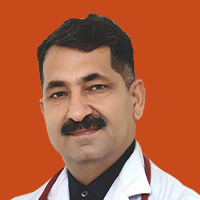

Successful Treatments
Clinics
Doctors
What is Thalassemia?
Thalassemia is an inherited blood disorder which causes your body to have less haemoglobin than normal. Haemoglobin enables red blood cells to carry oxygen. This condition can cause anaemia, which can leave the infected person feeling fatigued.
If a person has mild thalassemia, treatment may not be needed, but severe forms of this disorder might require regular blood transfusions.
Thalassemia Causes of Thalassemia
Thalassemia is caused by DNA mutations of cells that make haemoglobin. These mutations are passed from parents to children.
Signs and Symptoms of Thalassemia
Symptoms
Fatigue
People with thalassemia have fatigue due to anaemia
Weakness
Weakness can happen due to less production of haemoglobin In the body because of thalassemia
Pale or yellowish skin
The appearance of the skin can be pale or yellowish due to anaemia and jaundice brought about because of thalassemia
Facial bone deformities
People who have thalassemia may experience facial bone deformities due to the expansion of bone marrow
Slow growth
Growth issues in people with thalassemia can be due to a number of factors such as anaemia, iron overload, endocrine issues, nutritional deficiencies and/or bone dysplasia
Abdominal swelling
This can happen due to an enlarged spleen caused by thalassemia
Dark urine
This is caused by increased levels of bilirubin, which is a breakdown product of red blood cells
Do you have any of the following symptoms?
- Fatigue
- Weakness
- Pale or yellowish skin
- Facial bone deformities
- Slow growth
- Abdominal swelling
- Dark urine
Types of Thalassemia
Haemoglobin molecules are made up of chains known as alpha and beta chains which can be affected by mutations. In this disorder, production of either alpha or beta chains is reduced, which results in alpha-thalassemia or beta-thalassemia.
Alpha-Thalassemia
Alpha haemoglobin chain is made by four genes, with two being given from each parent. If you have:
One mutated gene: you will have no signs or symptoms of thalassemia, but you are a carrier and can pass it on to your children
Two mutated genes: you will have mild signs and symptoms. This condition is also called alpha-thalassemia trait
Three mutated genes: you will have moderate to severe signs and symptoms
Inheriting four mutated genes is rare and usually results in stillbirth.
Beta-Thalassemia
Beta haemoglobin is made of two genes, with one gene being given from each parent. If you have:
One mutated gene: you will have mild signs and symptoms. This condition is also called beta-thalassemia or thalassemia minor
Two mutated genes: you will have moderate to severe signs and symptoms. This conditions is called thalassemia major or Cooley anaemia
Babies born with two mutated beta haemoglobin genes are healthy at birth but can develop signs and symptoms within the first two years of life. Thalassemia intermedia, a milder form can also result from two mutated genes.
Risk Factors for Thalassemia
Family history of thalassemia: it is passed from parents to children through mutated haemoglobin genes
Certain ancestry: it occurs most often in African Americans and in people of Mediterranean and Southeast Asian descent
Complications of Thalassemia
Iron overload: people with thalassemia can get too much iron in their bodies, either because of the disease or from getting frequent blood transfusions. Too much iron can damage the heart, liver and endocrine system
Infection: people with thalassemia have an increased risk of infection, especially if you have gotten your spleen removed
Bone deformities: this disorder can make your bone marrow expand, which then causes your bones to widen. This can then result in abnormal bone structure, especially in the skull and face. This expansion of bone marrow makes bones brittle, which increases the chance of broken bones
Enlarged spleen: the spleen helps the body fight infection and filter unwanted material, like old or damaged blood cells. Thalassemia causes the destruction of a large number of red blood cells which causes the spleen to enlarge
Slowed growth rates: anaemia can slow down a child's growth and delay puberty
Heart problems: severe thalassemia is associated with congestive heart failure and abnormal heart rhythms
Jiva Ayunique™ Treatment Philosophy - A Holistic Approach to Thalassemia
Jiva Ayurveda offers holistic Ayurvedic treatment of Thalassemia by using evidence-based Ayurveda. The treatment plans are customised to target the root causes of the disease, and instead of just treating symptoms, they focus on holistic healing, balance and stability in totality.
Core Principles of the Jiva Ayunique™ Treatment Philosophy
HACCP Certified Ayurvedic Medicines: Scientifically-formulated mixtures that help restore balance in the body and maintain emotional stability.
Dietary Adjustments: Avoid consumption of iron-rich food and try to eat simple and light meals which won’t put extra pressure on the body.
Lifestyle Modifications: Stress management, regular exercise, adequate rest and sleep, and avoidance of environmental toxins are important factors to take care of.
Meditation and Yoga: Asanas like Yastikasana, Ardha Matsyendrasana, Parvatasana, Gomukhasana, Trikonasana and Marjariasana help ease the symptoms of Thalassemia.
Ayurvedic Medicine for Thalassemia
Ayurveda is the traditional system of medicine of India and includes the usage of herbs for rebalancing the energies in the body and improving overall health. In cases of blood-related diseases such as Thalassemia, specific Ayurvedic medicines are used which concentrate on improving bone density and contributing towards better bone health. Listed below are some recommended Ayurvedic herbs which can help in managing Thalassemia:
Ashwagandha: it helps boost red blood cell production and strengthens the immune system.
Guduchi: it has adaptogenic properties which may help in coping with stress and support overall well-being.
Turmeric: it has powerful anti-inflammatory properties and potent antioxidants.
Frequently Asked Questions (FAQs)
How to detect Thalassemia?
It can be detected via blood and genetic tests, such as complete blood count, special haemoglobin tests and genetic testing.
What food should not be eaten if a person has thalassemia?
Avoid red meat, seafood, iron-rich foods and vitamin C foods.
When can thalassemia be detected?
Thalassemia can be detected during pregnancy, soon after birth, or at any time through a blood test. It is best to get tested for it before 10 weeks of pregnancy.
Top Ayurveda Doctors
Our Happy Patients
Home Remedies
- पेट में गैस, जलन या संक्रमण? इन घरेलू उपायों से पाएं राहत
- पेट में गैस, अपच और फुलाव का आयुर्वेदिक इलाज - मुफ़्त परामर्श
- एनल फिशर से परेशान हैं? ये आयुर्वेदिक नुस्खे देंगे राहत और आराम
- कब्ज़ का आयुर्वेदिक इलाज - मुफ़्त परामर्श
- एसिड रिफ्लक्स का घरेलू इलाज - मुफ़्त आयुर्वेदिक परामर्श
- Food Poisoning का आयुर्वेदिक इलाज - मुफ़्त परामर्श
- क्या बार-बार उल्टी हो रही है? इन घरेलू उपायों से पाएं तुरंत आराम
- क्या आप जानते हैं? इन नुस्खों से पेट दर्द जड़ से खत्म होता है!
- बार-बार एसिडिटी? ये देसी नुस्खे तुरंत देंगे आराम!
- दवा की ज़रूरत नहीं! लूज़ मोशन का रामबाण इलाज घर पर ही
- Home Remedies for Vomiting
- Home Remedies for Piles
- Home Remedies for Food Poisoning
- Home Remedies for Stomach Infection
- Home Remedies for Bloating
- Home Remedies for Anal Fissure
- Home Remedies for Constipation
- Home Remedies for Acid Reflux
- Home Remedies for Acidity
- Home Remedies for Stomach Pain
Related Disease
- Ayurvedic Treatment for Acid Reflux
- Ayurvedic Treatment for Anemia
- Ayurvedic Treatment For Anorexia
- Ayurvedic Treatment for Chronic Fatigue Syndrome
- Ayurvedic Treatment For Gastritis
- Ayurvedic Treatment For Colitis
- Ayurvedic Treatment For Crohn’s Disease
- Ayurvedic Treatment for Weakness and Fatigue
- Ayurvedic Treatment For Flatulence
- Ayurvedic Treatment for Gallstones
- Ayurvedic Treatment for Jaundice
- Ayurvedic Treatment for Liver Cirrhosis
- Ayurvedic Treatment for Sickle Cell Anaemia
- Ayurvedic Treatment For Piles And Fissure
- Ayurvedic Treatment for Irritable Bowel Syndrome (IBS)
- Ayurvedic Treatment For Hyperacidity
- Ayurvedic Treatment for Constipation
- Ayurvedic treatment for Coeliac Disease
- Ayurvedic Treatment for Peptic Ulcer
- Ayurvedic Treatment for Tapeworm
- Ayurvedic Treatment for Typhoid
- Ayurvedic Treatment for Diarrhea
- Ayurvedic Treatment for Diverticulitis
- Ayurvedic Treatment for Pinworms
- Ayurvedic Treatment for Cholera
- Ayurvedic Treatment for Emphysema
- Ayurvedic Treatment for Food Poisoning
- Ayurvedic Treatment for Atherosclerosis
- Ayurvedic Treatment for Thalassemia
- Ayurvedic Treatment for High Triglycerides
- Get Ayurvedic Treatment for Gastroenteritis
Latest Blogs
- क्या वैरिकोज़ वेन्स और DVT एक-दूसरे से जुड़े हैं? आयुर्वेद बताता है असली फर्क
- क्या त्वचा पर कुछ हिस्सों का अचानक रंग हल्का होने लगना Hypopigmentation है या Vitiligo? आयुर्वेदिक भेद समझें
- क्या धब्बों के आसपास खुजली या हल्की जलन Vitiligo flare का संकेत है? आयुर्वेदिक दृष्टि से समझें
- क्या रसायनिक उत्पाद, रंग-बिरंगे क्रीम या फ्रेगरेंस त्वचा पर दाग बढ़ा सकते हैं? Vitiligo में त्वचा-संवेदनशीलता आयुर्वेद से जानें
- क्या परिवार में पहले से Vitiligo होने पर बच्चों में इसका खतरा बढ़ जाता है? आयुर्वेदिक कारण समझें
- क्या तनाव बढ़ते ही सफ़ेद दाग फैलने लगते हैं? Vitiligo में मन-त्वचा संबंध आयुर्वेद की नज़र से जानें
- क्या बार-बार पेट संबंधी समस्याएँ—गैस, अपच, कब्ज़—Vitiligo को ट्रिगर करती हैं? आयुर्वेदिक व्याख्या देखें
- क्या धूप में जाने पर सफ़ेद दाग और ज़्यादा साफ़ दिखने लगते हैं? Vitiligo को आयुर्वेद की नज़र से जानें
- क्या त्वचा पर छोटे-छोटे सफ़ेद धब्बे उभरना Vitiligo का शुरुआती संकेत है? आयुर्वेदिक दृष्टि से समझें
- क्या सोरायसिस में त्वचा के साथ-साथ जोड़ों में दर्द (Psoriatic Arthritis) भी शुरू हो सकता है? आयुर्वेदिक दृष्टि से संकेत देखें
- क्या बार-बार स्टेरॉइड क्रीम लगाए बिना राहत नहीं मिलती? Psoriasis में मूल कारण कैसे समझता है आयुर्वेद—जानें
- क्या गर्मी और मसालेदार भोजन आपके Psoriasis को तुरंत flare-up करते हैं? आयुर्वेदिक कारण जानें
- क्या बार-बार त्वचा को मॉइस्चराइज़ करने पर भी सूखापन और जलन कम नहीं होती? Psoriasis को आयुर्वेद की नज़र से समझें
- क्या घुटनों, कोहनियों और पीठ पर मोटे patches बनना Psoriasis का विशिष्ट लक्षण है? आयुर्वेदिक व्याख्या जानें
- क्या बार-बार एलर्जी जैसी खुजली और जलन Psoriasis की ओर इशारा कर सकती है? आयुर्वेदिक दृष्टिकोण से समझें
- क्या सिर की त्वचा पर लगातार पपड़ी गिरना Dandruff नहीं—Scalp Psoriasis का लक्षण हो सकता है? आयुर्वेदिक संकेत देखें
- क्या तनाव बढ़ते ही त्वचा पर अचानक flare-up होना Psoriasis का क्लासिक पैटर्न है? आयुर्वेदिक कारण समझें
- क्या ठंड बढ़ते ही त्वचा फटना, लाल धब्बे और खुजली Psoriasis को ट्रिगर करते हैं? आयुर्वेद की नज़र से जानें
- क्या त्वचा पर मोटी, सफ़ेद पपड़ी बनना Psoriasis का शुरुआती संकेत है? आयुर्वेदिक दृष्टि से समझें
- क्या सिर्फ फिज़्योथेरपी से फ्रोज़न शोल्डर ठीक हो सकता है? आयुर्वेद बताता है किस चरण में क्या असरदार है
Ayurvedic Doctor In Top Cities
- Ayurvedic Doctors in Bangalore
- Ayurvedic Doctors in Pune
- Ayurvedic Doctors in Delhi
- Ayurvedic Doctors in Hyderabad
- Ayurvedic Doctors in Indore
- Ayurvedic Doctors in Mumbai
- Ayurvedic Doctors in Lucknow
- Ayurvedic Doctors in Kolkata
- Ayurvedic Doctors in Patna
- Ayurvedic Doctors in Vadodara
- Ayurvedic Doctors in Ahmedabad
- Ayurvedic Doctors in Chandigarh
- Ayurvedic Doctors in Gurugaon
- Ayurvedic Doctors in Jaipur
- Ayurvedic Doctors in Kanpur
- Ayurvedic Doctors in Noida
- Ayurvedic Doctors in Ranchi
- Ayurvedic Doctors in Bhopal
- Ayurvedic Doctors in Ludhiana
- Ayurvedic Doctors in Dehradun









































